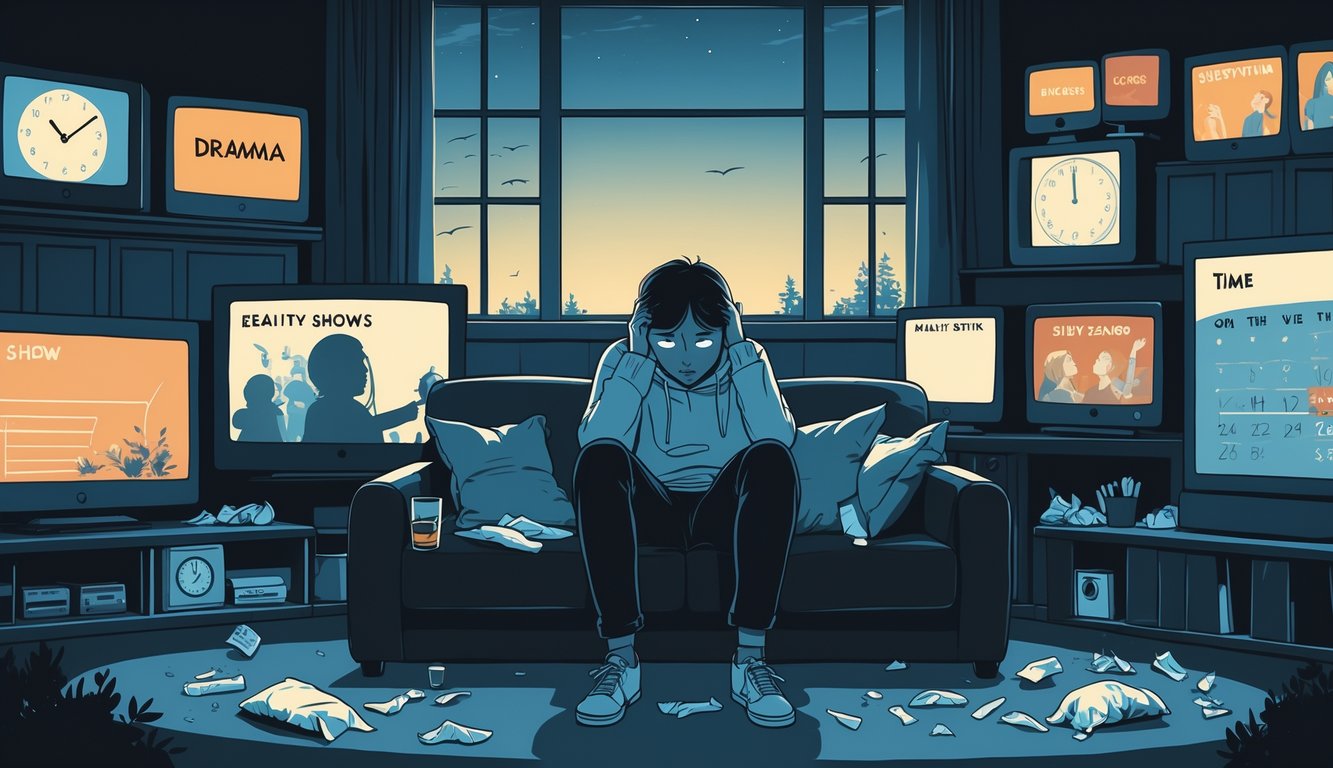
The Influence of Popular Shows and Cultural Phenomena
It’s honestly ridiculous—platforms don’t even let you breathe anymore. Next episode queues up before you realize the credits rolled. And we just… accept it? Binge-watching isn’t just some harmless time-killer; it hijacks big cultural moments, drags everyone into hours of TV, and suddenly you’re part of a “phenomenon” you never planned on joining.
case study: game of thrones
Remember when everyone pretended they didn’t stay up until 3 a.m. catching up on Game of Thrones? The red eyes at work said otherwise. At GoT’s peak, 51.5% of adults under 45 admitted to bingeing. Coincidence? Doubt it. Nobody tracks their screen hours when “one more episode” is basically peer pressure.
By season 8, HBO broke records. Alan Sepinwall (industry guy) said GoT “weaponized spoilers,” forcing everyone into weekend marathons so Monday morning didn’t ruin the plot. Sleep schedules? Destroyed. Digital wellbeing? Who cares—there are dragons. Most of my coworkers didn’t even like fantasy, they just didn’t want to be left out of the Monday gossip.
A public health researcher told me binge events around finales caused measurable spikes in office screw-ups. No one puts that in the HR memo. A 2019 survey actually links binge spikes to “event TV” moments. Quiet night alone? Nope. Somehow, I’m in a 2 a.m. text fight about Arya Stark. How did that even happen?
How Major Releases Shape Viewing Patterns
Big new releases? They just wreck whatever routine I thought I had. When Netflix dropped Stranger Things season three, Nielsen said there was a 20% jump in all-night viewing. I mean, duh. Studios and their “release schedules” plus that evil auto-play button? Forget about any hope of willpower. Sunday night used to be mine. Now it’s just me, the couch, and a bottomless pit of episodes.
Honestly, binge-watching isn’t just zoning out anymore. My software engineer friends—who, by the way, never seem to sleep—say streaming companies start prepping their servers weeks before a big show hits. It’s not just “watching TV” now. It’s some kind of group event: Discord threads, live-tweeting, spoiler-avoidance guides, and therapists (yes, really) talking about “show-induced anxiety.” ScienceDirect’s review says this urgency is nothing like old-school TV. It’s anxiety, FOMO, and habit all mashed together, and honestly, I’m not sure I like it.
Supposedly we’re in control, but are we? I missed a friend’s birthday just to finish a series before Instagram ruined it. Priorities: completely scrambled. Not sure I’m okay with it, but here we are.
Strategies for Healthier Binge-Watching Habits
The only reason I haven’t lost my mind during a “relaxing” binge is because I halfheartedly follow random advice about self-control. Ever drifted through three episodes, eyes dry, popcorn stale, and wondered what day it is? That’s me. Weirdly, every study I skim says building better habits is easier than pretending you’ll quit cold turkey every Monday, but I still don’t buy it.
Setting Boundaries and Screen Time Limits
Some guy at my optometrist’s office mentioned the 20-20-20 rule: every 20 minutes, look 20 feet away for 20 seconds. Nobody I know actually does this. Honestly, these apps don’t want us to stop—Netflix literally auto-plays the next episode, so good luck keeping track of time. Didn’t know “binge fatigue” was even a thing, but apparently experts in this WebMD slideshow say eye strain, headaches, and blurry vision show up before you even feel guilty.
I keep a dirt-cheap kitchen timer next to the remote—my phone’s “screen time” warnings are a joke after 9pm. Some behavioral scientist in a Journal of Behavioral Addictions study blamed mood crashes on bingeing, but their big tip? Stand up and leave the room between episodes. So I do. Does that make me some kind of rebel? Doubtful. Which is worse, waiting for a show to buffer or realizing it’s already Sunday?
Encouraging Balanced Entertainment Choices
Mix up genres, seriously. No one’s glued to four hours of worm documentaries—trust me, I tried. Weirdly, switching things up kills the urge to keep clicking “next.” One NeuroLaunch study suggests tossing in short comedies or random stand-alone movies if you’re stuck in a rut.
I started alternating shows with actual chores (laundry sprints, checking the mailbox for junk mail I never read) and it broke the autopilot. Balanced entertainment, I guess, tricks your brain into remembering life exists outside the screen. Some psychiatrist (caught him in an elevator, so who knows) said mixing active and passive stuff adds “friction” to the binge cycle. Whatever that means, it works better than any app I’ve tried and ditched five minutes later.



